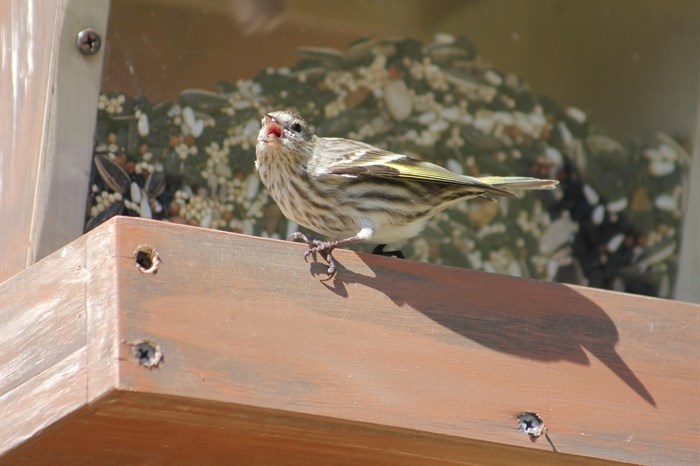
FILE PHOTO - A pine siskin at a bird feeder.
Image Credit: Pixabay
March 18, 2021 - 8:00 PM
A B.C. SPCA wild animal manager is asking residents in Kamloops and the Okanagan to take their bird feeders down due to reports of birds getting sick from salmonella.
Andrea Wallace manager with wild animal welfare a the SPCA said sick birds have been reported in the southern Interior. In January, the non-profit initially reported the bacteria found in backyard bird feeders was killing pine siskins in the Lower Mainland.
“The salmonella outbreak is widespread. We’ve had reports across Vancouver Island but also across the province,” Wallace said.
READ MORE: B.C. SPCA warns of dangers to birds with backyard feeders
There have been more than 60 pine siskins admitted to the SPCA's Wild Animal Rehabilitation Centre on Vancouver Island and the Lower Mainland's Wildlife Rescue Association of B.C. has seen hundreds of pine siskins infected with salmonella, Wallace said.
The SPCA received several calls from Penticton, Westwold, Cranbrook and Creston, and have received two reported instances of sick birds in Vernon.
Initially the SPCA asked residents in January to take feeders down to curb the spread of the bacteria and Wallace said the non-profit is continuing to issue advice to avoid feeders until the warmer weather arrives in April and May.
“We generally see less spread of disease in the summer, however the B.C. SPCA also doesn’t recommend feeding birds in the summer since there’s lots of food out there for them in the wild. Bird feeders are really a source of contamination and disease for birds so they do carry risks if people aren’t maintaining them properly,” she said.
The outbreak appears to be only with pine siskins but other birds — and cats who eat sick birds — can also get salmonella, Wallace said. Sick birds may appear lethargic, unusually fluffed up, and show signs of irritation around the eyes.
Wallace said it’s possible that more people are at home feeding birds because of the pandemic, but it’s currently unknown why the outbreak is happening now among pine siskins.
Feeders need to be cleaned in hot and soapy water before being soaking in a bleach solution for a few minutes. They also needs to be air dried before being put back up. Feeders need to be cleaned every two weeks, Wallace said.
“We recommend that the feeders come down and stay down until the outbreak is over,” she said.
For more information on what to do if you see sick birds, visit the SPCA’s website here.
To contact a reporter for this story, email Carli Berry or call 250-864-7494 or email the editor. You can also submit photos, videos or news tips to the newsroom and be entered to win a monthly prize draw.
We welcome your comments and opinions on our stories but play nice. We won't censor or delete comments unless they contain off-topic statements or links, unnecessary vulgarity, false facts, spam or obviously fake profiles. If you have any concerns about what you see in comments, email the editor in the link above.
News from © iNFOnews, 2021